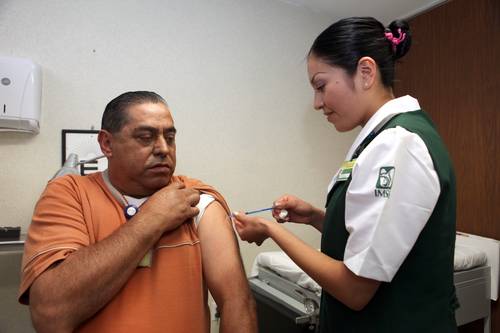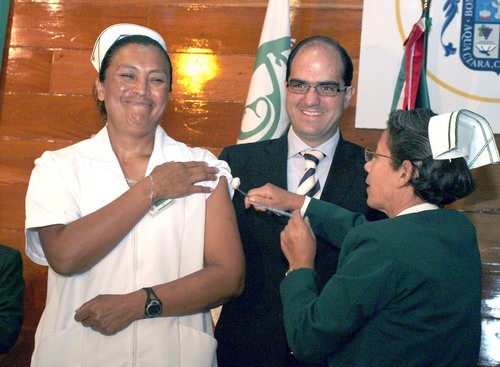Mutation of the H1N1 influenza virus was detected in Mexico since April, according to Indre
More cases will be sought through genetic sequencing of samples of the strain: Celia Alpuche
Pregnant workers and 28 of the IMSS clinic, located in San Borja Gabriel Mancera and were vaccinated against influenza yesterday A/H1N1Foto Victor Camacho
?ngeles Cruz Martinez
La Jornada
Friday, 27 November 2009, p. 37
The mutation of the H1N1 influenza virus reported by Norway was also found in Mexico, but since April, one of the first ill patients treated at the National Institute of Respiratory Diseases (INER). So far there is no evidence that such change conditional aggressiveness of the disease, said Celia Alpuche, director of the Institute of Epidemiological Diagnosis and Reference (Indre).
He said the recommendation of the World Health Organization (WHO) countries where the mutation has been found will look for other cases by genetic sequencing of samples of the strain.
In Mexico, the procedure will begin next week with 50 samples found in the Indre people died from the new flu, those patients who were serious and 10 percent of outpatients.
In an interview during a forum on genomic medicine and infections organized by the National Institute of Public Health, the official explained that the mutation is located in a segment of the hemagglutinin (a protein found on the surface of the virus), which is an amino acid different to that shown in the H1N1 strain.
Moreover, the Mexican Social Security Institute (IMSS) announced the start of the implementation of the new flu vaccine. The first batch consists of 299 thousand doses, which apply to medical personnel who have contact with those affected by the infection, women in the third trimester of pregnancy, children six to 24 months old and caregivers of infants under 6 months.
The agency purchased 12 million doses of the biological and deal with the outbreak of influenza in the winter season has 280 thousand antiviral treatments. In relation to the conduct of the pandemic, noted that in the past week was a decrease of almost 50 per cent in the number of cases.
Alpuche confirmed this information: "the curve of cases seems to have entered a plateau, mainly in the states of central and northern Iraq, but could rise again in other regions," he said.
With respect to the mutation of H1N1 virus, the specialist said the case reported by Mexico was for the second patient treated at the INER grave, who died. He said the Indre made 29 genetic sequencing of the eight most important genes of the strain in different individuals, and found only one variation.
The same mutation has also been detected in the United States, China and Brazil, among others. In recent days the information gained relevance because Norway the first found. When this happened the WHO requested information to other nations about the clinical characteristics of patients and found that some had been severe and mild cases.
Hence, it is impossible to conclude whether this change affects the severity of the infection.
Sporadic resistance to antivirals: WHO
WHO reported that since the emergence of the pandemic have presented 75 cases of resistance to the antiviral oseltamivir, of which nine were located in Wales (United Kingdom) and four in North Carolina (United States).
In conference in Geneva, Switzerland, Keiji Fukuda, special adviser on pandemic international agency, said some of these patients also carry HIV / AIDS.
He noted that the cases are sporadic resistance to the antiviral and help overcome the new flu. "So far there has been a change in the epidemiology of the disease," said the expert.
Antivirals are still effective if given in a timely and correct, he said.


Comment